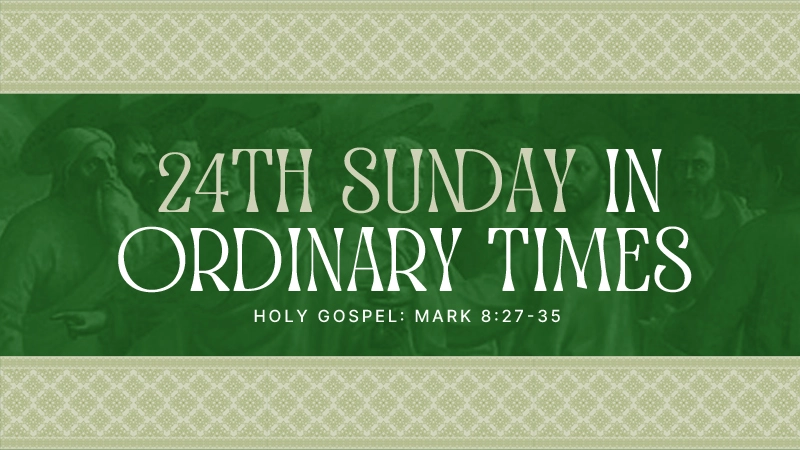Sunday Reflections | 24th Sunday in Ordinary Times
By SIDTP SoCom
Published on September 15, 2024
Jesus and his disciples set out for the villages of Caesarea Philippi. Along the way he asked his disciples, “Who do people say that I am?” They said in reply, “John the Baptist, others Elijah, still others one of the prophets.” And he asked them, “But who do you say that I am?” Peter said to him in reply, “You are the Christ!” Then he warned them not to tell anyone about him.
He began to teach them that the Son of Man must suffer greatly and be rejected by the elders, the chief priests, and the scribes, and be killed, and rise after three days. He spoke this openly. Then Peter took him aside and began to rebuke him. At this Jesus turned around and, looking at his disciples, rebuked Peter and said, “Get behind me, Satan. You are thinking not as God does, but as human beings do.”
He summoned the crowd with his disciples and said to them, “Whoever wishes to come after me must deny himself, take up his cross, and follow me. For whoever wishes to save his life will lose it, but whoever loses his life for my sake and for the sake of the gospel will save it.”
In this part of Mark’s Gospel, Jesus and His disciples are traveling to the villages near Caesarea Philippi. On the way, Jesus asks them, “Who do people say that I am?” The disciples reply that some people think Jesus is John the Baptist, Elijah, or one of the prophets.
Then Jesus asks them directly, “But who do you say that I am?” Peter answers with confidence, “You are the Christ!” This is a big declaration because it means Peter recognizes Jesus as the promised Savior. Even so, Jesus tells them not to spread this information yet.
Jesus then starts teaching them about what’s ahead: He will suffer, be rejected by the leaders, be killed, and rise from the dead after three days. Peter, shocked by this, tries to correct Jesus. Jesus responds strongly, telling Peter, “Get behind me, Satan. You are thinking not as God does, but as human beings do.” Jesus’ words show that Peter doesn’t fully understand Jesus’ mission or what it means to follow Him.
Jesus then speaks to the crowd and His disciples, saying, “If you want to follow me, you must deny yourself, take up your cross, and follow me.” He explains that if you try to save your own life by avoiding difficulties, you’ll end up losing it. But if you are willing to give up your life for His sake and the good news, you will truly save it.
This passage teaches us a lot about what it means to be a follower of Jesus. Recognizing Jesus as the Christ is important, but following Him means understanding that it involves suffering and sacrifice. Jesus’ response to Peter shows us that God’s plans are often different from our own expectations.
As we reflect, we are invited to consider our commitment to Jesus. Are we prepared to follow Him wholeheartedly, accepting the challenges and sacrifices that come with true discipleship? This reflection calls us to embrace a faith that goes beyond recognition and involves a deep, often difficult, commitment to living out Jesus’ teachings.



